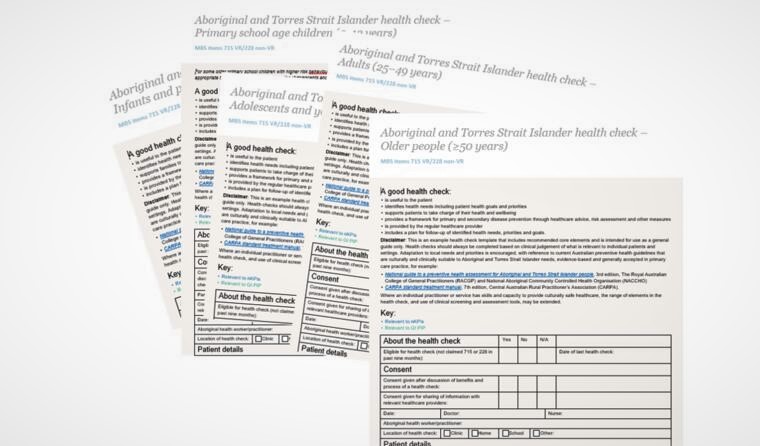News
Updated health check templates ‘a huge step’ forward
The new Aboriginal and Torres Strait Islander annual health check templates, developed by the RACGP and NACCHO, are already making a difference.
 The new health check templates are not intended to promote a tick box approach to healthcare, but rather to prompt clinicians to consider patient priorities and goals.
The new health check templates are not intended to promote a tick box approach to healthcare, but rather to prompt clinicians to consider patient priorities and goals.
The RACGP has welcomed the Medicare Benefits Schedule (MBS) Review Taskforce’s endorsement of recommendations made by the Aboriginal and Torres Strait Islander Health Reference Group to update the MBS 715 descriptor and associated notes to align with the new annual health check templates.
Updated as part of the RACGP and National Aboriginal Community Controlled Health Organisation (NACCHO) Partnership Project, Clinical Lead Dr Mary Belfrage says the new templates are an important step in improving health outcomes.
‘The Department of Health [DoH] has been very supportive of the development of the new templates, recognising the substantial improvement,’ she told newsGP.
‘They are more evidence-based, more age appropriate, and more culturally appropriate. That’s why having a collaborative and co-design approach was really important – so it builds confidence from the sector.’
A key recommendation from the working group, established in 2019 to review the templates, was that they be reworked to better reflect age-appropriate health needs. This resulted in five new templates that span the life course:
- infants and preschool (birth–5 years)
- primary school age (5–12 years)
- adolescents and young people (12–24 years)
- adults (25–49 years)
- older people (50+ years)
Dr Belfrage says the aim is to steer away from a ‘tick box approach to healthcare’, instead prompting clinicians to consider patient priorities, opportunities for preventive healthcare and common health needs.
‘To actually do that effectively it isn’t enough just to do the health check,’ she said.
‘The health check needs to be responding to health needs that the patient recognises, so it has to include patient priorities and goals to be effective. There also needs to be a response to, and follow up of, identified health needs – that’s really, really key.
‘If it’s valuable for individual patients, hopefully then it also supports population health outcomes.’
Since their release on the
NACCHO RACGP Resource Hub in July, the templates have been tested for operability in a range of services.
Dr Geoff Spurling has been putting them to the test at Inala Indigenous Health Service in Queensland.
During the course of his PhD, which focused on health checks, Aboriginal and Torres Strait Islander patients reported that the standard health check process was too long, alienating, and as a result, failed to get to the heart of the patient’s definition of health.
‘[W]e interviewed community members about what should go into health checks and what their health priorities were. Turns out it wasn’t diabetes, heart disease and things like that – it was more the social determinants of health,’ Dr Spurling told
newsGP.
‘So experiences of racism, whether they were employed and could get a job, whether they’d had interactions with the police, whether there was violence in their life, and experiences of grief were really prominent.
‘Also whether they’re involved in community and cultural activities, which you don’t really get in a standard health check.’
For Dr Spurling these findings were revolutionary.
 There are five new health check templates that span the life course and consider patient priorities and goals.
There are five new health check templates that span the life course and consider patient priorities and goals.
Since the templates were updated, he says out of around 3000 health checks, the majority have been well-received by patients. Conversely, the transition has posed challenges for some non-Indigenous clinicians.
‘GPs found those questions pretty challenging to ask because they weren’t the usual biomedical things that doctors have been trained to ask about, and there’s also the cultural element,’ Dr Spurling said.
‘I think they thought patients were going to jump up and say “what are you asking me about racism for?”. We’ve had a couple of patients say [that], but the majority accept that of course you’ll be asking that because that’s our health.
‘Actually, some stories are coming out that the GPs wouldn’t have otherwise heard because they’re asking those questions.
‘The hope is that it’ll lead to referral pathways and perhaps funding for improved referrals and resources to deal with the social issues that arise.’
Dr Spurling says the collaborative nature of the Partnerships Project has been ‘essential’, and ‘a huge step’ forward.
‘It’s what’s required,’ he said.
‘The existing health check just wasn’t good enough, so it’s really exciting to have the RACGP, NACCHO and the software vendors all talking about how to make this better.
‘That’s definitely going to lead to an improvement in Aboriginal and Torres Strait Islander people’s experience of a health check, and hopefully their health as well.’
Dr Belfrage agrees.
‘We look forward to the [Federal Health] Minister’s response to the MBS Review Taskforce report and to the updated MBS Descriptor and associated notes in the new year,’ she said.
The new Aboriginal and Torres Strait Islander health check templates are available via the NACCHO RACGP Resource Hub. GPs can also access the ‘National guide to a preventive health assessment for Aboriginal and Torres Strait Islander people’ on the RACGP website.
Log in below to join the conversation.
715 health check Aboriginal and Torres Strait Islander health cultural safety
newsGP weekly poll
Are you interested in prescribing ADHD medication?